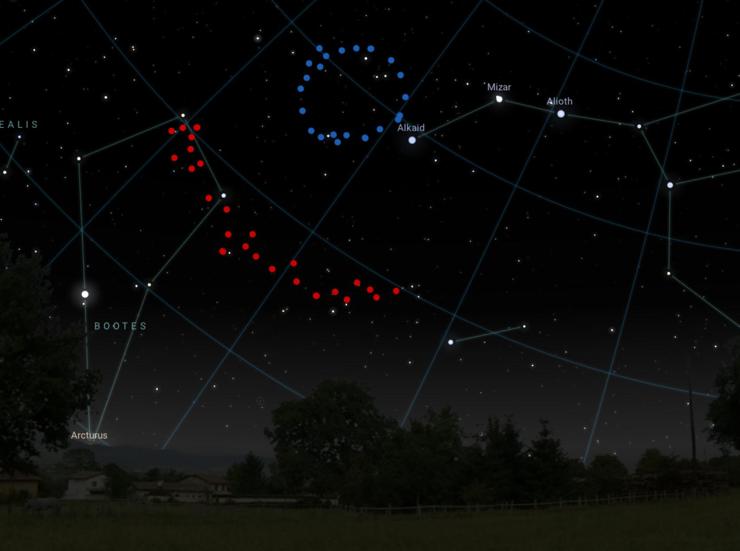
Meeting at London's Royal Society will scrutinise basic model first formulated in 1922 that universe is a vast, even expanse with no notable features.
If you zoomed out on the universe, well beyond the level of planets, stars or galaxies, you would eventually see a vast, evenly speckled expanse with no notable features. At least, that has been the conventional view.
The principle that everything looks the same everywhere is a fundamental pillar of the standard model of cosmology, which aims to explain the big bang and how the universe has evolved in the 13.7bn years since.
But this week a meeting of some of the world's leading cosmologists will convene at London's Royal Society to ask the question: what if this basic assumption is wrong?
The meeting comes after a number of high-profile astronomical observations have challenged the conventional view, according to Prof Subir Sarkar, a cosmologist at the University of Oxford and co-organiser of the meeting.
"We are, in cosmology, using a model that was first formulated in 1922," he said. "We have great data, but the theoretical basis is past its sell-by date. More and more people are saying the same thing and these are respected astronomers."
The conference brings together some of the scientists behind the recent anomalous findings. These include observations that suggest the universe is expanding more quickly in some regions than others, hints at megastructures in the night sky and evidence for cosmic flows – vast celestial rivers of material on a scale that cannot be readily accommodated within conventional theories.
Dr Nathan Secrest, of the US Naval Observatory and a collaborator with Sarkar, is presenting findings that raise the possibility that the universe is slightly lopsided. After analysing a catalogue of more than 1m quasars (extremely luminous galactic cores), the team found that one hemisphere of the sky appeared to host roughly 0.5% more sources than the other.
It may not sound like a major discrepancy but, according to Sarkar, if confirmed it would undermine the basis for dark energy, which is supposed to be the dominant component of the universe. "It would mean that two-thirds of the universe has just disappeared," Sarkar said.
Dr Konstantinos Migkas, of Leiden University, will share findings that the Hubble constant – the rate at which the universe is expanding – appears to vary across space. "Our results add another problematic piece to the puzzle," Migkas said. At a local scale, at least, this suggests that observations do not match predictions of the standard model. "We can't extrapolate that it's wrong over the full universe," he added.
Alexia Lopez, a PhD student at the University of Central Lancashire, has discovered what appear to be cosmic megastructures, named Big Ring and Giant Arc. These shapes, traced out by galaxies and galaxy clusters, occur on a scale beyond which the universe should be smooth and effectively featureless.
"When we're finding a list of structures that are exceeding this scale, are they challenging this assumption that is so fundamental in cosmology?" said Lopez. "Maybe there needs to be more of a critical analysis of our standard model."
Sarkar suggests that belief in the standard model of cosmology has been so deeply ingrained that it is treated as "the religion". "I find that frankly annoying that this principle hasn't been checked," he said, although not everyone agrees with this characterisation.
Prof George Efstathiou, an astrophysicist at the University of Cambridge, who is presenting a more sceptical take at the conference, said it was not true that the model had not been repeatedly interrogated. "People accuse me of defending the model," he said. "But what they don't realise is how much time I've spent trying to disprove it. I completely disagree that's there's some kind of groupthink."
Efstathiou said that while intriguing, none of the anomalies being presented were compelling enough to undermine standard theories. "The question is: how good are the data?" he said. The claimed lopsidedness of the universe, for instance, could be due to the necessary use of multiple telescopes to observe different hemispheres of the sky, so that sifting through data to look for patterns would inevitably throw up what appeared to be anomalies, he suggested. "The Big Circle in the sky, I definitely don't believe in," he said.
Prof Wendy Freedman, who is presenting new findings from the James Webb space telescope, said: "Here are all these tantalising threads at varying levels of significance. We need more exploration on where, if at all, the standard model breaks down. I don't think there is an obvious thing that is going to stand the test of time."
This kind of robust debate is welcome at the conference. "I'm looking forward to a vigorous discussion," said Sarkar. "Let them come at it with everything they've got."




